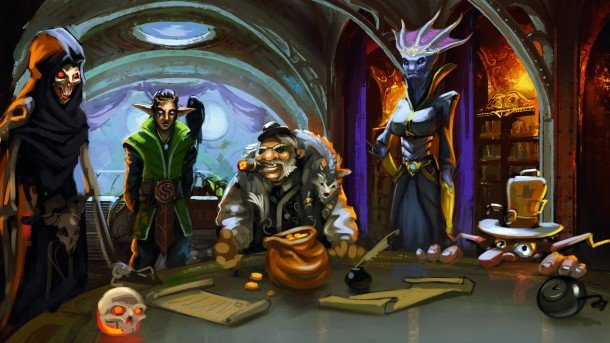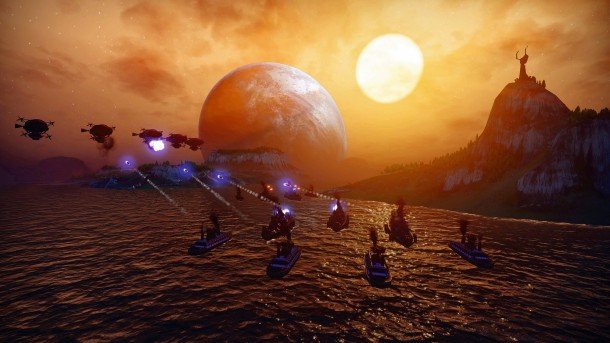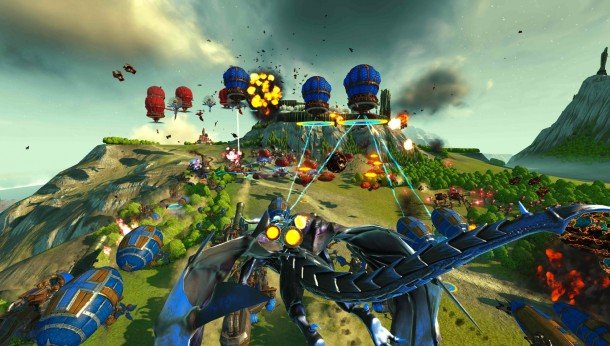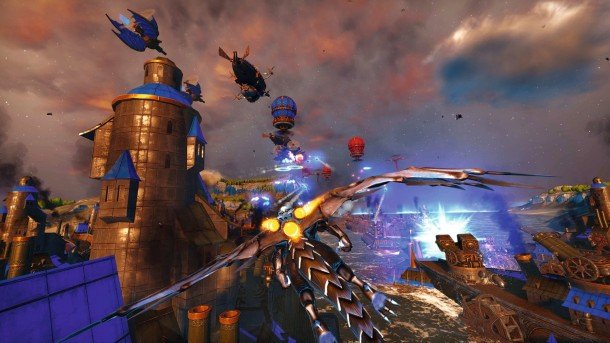Divinity: Dragon Commander hands-on: war and governance in a world of dragons in jetpacks

The simplest part is your council: one of them will propose a new law, in response to some recent controversy, and the others will weigh in on whether they think you should pass it. Despite the fantasy setting, all the issues are taken directly from modern-day newspaper stories: the elves want to legalise gay marriage, for example, but the undead are dead against it. Each race is a thinly veiled analogue for a real-life political party, and your decisions affect their long-term disposition towards you.
"At some point you'll also be forced to get married, apparently for political reasons"
The various species you're trying to keep happy aren't factions on the map: they're all part of both warring empires, both of whom fight with interchangeable robots. Listening to a hideous living skeleton denounce homosexuality as 'unnatural' is entertaining, but this part always felt rather disconnected from the cataclysmic war that's going on around it. Should you be prosecuted for crimes against someone trespassing in your home? I don't know, can we think about this when we're at less than 4,000 casualties per turn?
Then there are personal stories: you also have generals aboard your airship, and they'll come to you with their problems. As far as I played, all you need to do is make a decision: yes, I'll do what you ask, or no, I don't agree with your proposition. But these storylines have several stages, and the combination of your decisions can lead you to several different endings. At some point you'll also be forced to get married, apparently for political reasons, and your new wife will have a similar ongoing story built from decisions you make between turns. Yes, it has to be a woman – even if you legalised gay marriage.

While these scenarios always leave the choice to you, it's hard not to feel like the game is making some judgments of its own in the way it presents them. One of your generals has a storyline in which she advocates for women's rights, starting with equal pay for the females on your staff. But while her proposal is reasonable, her justifications are presented as the ravings of a man-hating lunatic: she calls women the 'superior' gender and believes they should rule over men.
If you choose the undead bride, one of the options in her storyline is to transform her into a human. “A half-naked human, I notice!” I say to Larian CEO Swen Vincke, looking at some concept art of her topless human form. Swen agrees.
“Yes! It's a game for boys... it's not really for girls.”
If you're not happy with your bride, I'm told, you can make a deal with a demon to have her discreetly killed. That way, you can take a new one without political controversy. There's even a different form of murder for each species of wife.
Keep up to date with the most important stories and the best deals, as picked by the PC Gamer team.

The game doesn't force you down any of these paths, of course, but their presence gave the story side of Dragon Commander a seedy feel that made it harder for me to engage with. A sense not just that it's for boys, but that it's for a particular kind of boy.
"Everything except the story also works in multiplayer"
Once you've made all your decisions, you return to the strategy map and go through it all again for the next turn. That's when Dragon Commander might get really interesting. If you got beaten by a lot of air units in one of your RTS battles last turn, you can buy anti-air rockets for your Hunter jeeps. If the enemy dragon commander caused you a lot of grief with his Protect spell, you can start researching it yourself. And if you've made one of the races happy with your political decisions, they might grant you a card that'll give you an advantage – such as a few free units – for whatever battle you choose to play it in.
Everything except the story also works in multiplayer, in teams: you take turns on the strategy map simultaneously, and then everyone playing participates in each skirmish. If you don't have any units in the territory concerned, your dragon still shows up and you can build an army from scratch to help out your ally.
The idea of a long-term campaign where each turn involves handling so many different systems and concerns is exciting. But we won't know how well it works until all those pieces are finalised, and we can play it long enough for all of them to come into effect.


